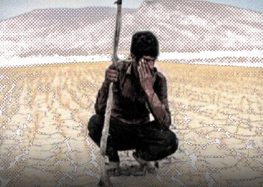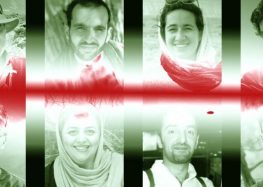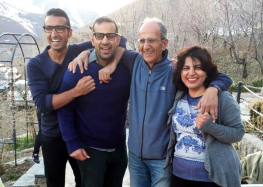Iranian Hardliners Continue Attacks on Former Environmental Official Kaveh Madani
Western-Educated Water Management Expert Left Iran After Being Arrested by IRGC’s Intelligence Organization
Hardline media outlets in Iran with ties to the Islamic Revolutionary Guard Corps (IRGC) have continued smearing the former deputy head of the Department of Environment (DOE), Kaveh Madani, following his sudden resignation and departure from Iran.
Madani, a 36-year-old US-educated water management expert, was invited to join the DOE by its director, Isa Kalantari, in September 2017. He resigned from his post and left the country in April 2018, writing in his resignation letter that he had been spied on from the moment he set foot in Iran.
Madani was arrested in February 2018 during a crackdown on environmentalists by the IRGC’s Intelligence Organization and interrogated for at least two days before he was released. At least 13 environmentalists have been detained in Iran since January 2018 and accused of spying for foreign governments.
Reformist Member of Parliament (MP) Mahmoud Sadeghi wrote in an open letter to the IRGC’s Intelligence Organization, which carried out many of the arrests, that its treatment of Madani was “disheartening” and called on the organization’s head, Hossein Taeb, to respect people’s rights.
“From the moment Madani arrived and during several months of service in the country until he was finally forced to leave his homeland, the behavior of agents under your command toward this brilliant young man, who had come to Iran with the hope of being of service to the country’s environment despite having a high professional status and job opportunities abroad, dashes young people’s hopes of being able to participate in serving their country,” Sadeghi wrote.
The outspoken MP added: “Your outlook toward social and political matters from a security lens has been one of the characteristics of your excellency’s management style, which has seriously harmed the IRGC’s position in the minds of the public. For example, the actions of the organization under your command toward environmental activists has, on the one hand, been in complete discord and conflict with deputies and authorities at the Intelligence Ministry and, on the other hand, in complete and blatant violation of the rights of the suspects who have remained in detention for about three months without the right to counsel and denied family visitation.”
The IRGC’s intelligence wing became an official state organization by order of Supreme Leader Ali Khamenei in 2009 and has operated in parallel with the objectives of the Intelligence Ministry without governmental oversight. The IRGC’s Intelligence Organization is directly responsible for widespread violations of civil and political rights in Iran.
In addition to detaining civil rights and political activists as well as pro-reform journalists on bogus national security charges, the organization has also arrested a number of officials in President Hassan Rouhani’s government, including a member of his nuclear negotiating team, Abdolrasoul Dorri Esfahani.
Investigations by the Center for Human Right in Iran (CHRI) show that in at least 12 recent cases involving journalists, reformist activists, dual nationals, and trade unionists, the IRGC’s Intelligence Organization has routinely denied the detainees due process, and carried out physical and psychological torture to extract false confessions. In addition, the organization has exerted pressure on the detainees’ families and threatened to take severe action if they speak with media outlets.
IRGC-Affiliated Media Attempt to Smear Madani and Call For His Resignation
Following Madani’s brief arrest on February 11 and prior to his departure from Iran, hardline media outlets with ties to the IRGC attempted to smear his reputation and called for his resignation.
On February 15, the daily Kayhan, which is controlled by the supreme leader, suggested that Madani was spying for enemy governments without providing evidence. The hardline newspaper also incorrectly identified Madani as a dual national.
“The head of the DOE must answer two questions regarding Mr. Madani. First, why did he pick a dual national as his deputy and secondly, why did he put a dual citizen with ties and positions in enemy states in charge of vital projects, especially related to water?” said the unsigned commentary.
But according to the head of the Department of Environmental Studies at the Imperial College in London where Madani worked for five years as a senior academic, Madani is an Iranian citizen who was hired on a UK employment visa.
Far right news outlets in Iran also tried to smear Madani’s character.
On March 31, Tasnim, a news agency that maintains close ties with the IRGC, published a photo showing Madani dancing at a private party with a woman who was not wearing a hijab—a prohibited act by any Iranian government official.
Madani, who was on a business trip abroad when the article was published, submitted his resignation shortly after.
In his resignation letter, Madani complained of constant interference in his private and professional life by an unnamed security agency.
“Although I had worked in this post for several months and my goals, thoughts, behavior and actions had become well known to [friends and concerned supporters of the state], nevertheless they reviewed all available documents containing the smallest details of my personal and professional life during the years I lived abroad. These actions did not decrease but actually intensified and a cast shadow on my loved ones as well,” Madani wrote.
In response, DOE Director Isa Kalantari praised Madani and wrote on April 21, “Without despair, you welcomed the opinions of the public and experts with a positive attitude. You will never be forgotten by the DOE personnel or the people.”
“Given your brilliant capabilities and competence, as well as your intellectual maturity and firm belief in the national interests of this country, I am certain you will never deny helping the people of Iran wherever you may be,” he added.
The strong words of support for Madani by Kalantari, who is also Rouhani’s vice president, reflects the political divide between the government and the security establishment regarding the former DOE official.
On April 17, Mohammad Reza Tabesh, a reformist MP and member of the parliamentary faction on environmental affairs, said, “Some agencies have accused these individuals [environmentalists] of spying but that is somewhat against the expert view of the Intelligence Ministry.”
He added: “According to statements by the head of the DOE, there are differences of opinion between the Intelligence Ministry and some other agencies about whether the detained environmental activists are spies.”
Hardliners’ Attacks Reach Beyond Environmentalists to Dual Nationals
Despite Madani’s resignation and departure from Iran, hardliners have continued to attack him without any evidence or judicial inquiry, accusing him and other dual nationals of engaging in espionage.
But according to reformist media, the IRGC framed the environmentalists after they tried to prevent the building of missile sites on environmentally sensitive lands in Iran.
On April 22, Kayhan published a commentary titled, “His debauchery aside, Madani’s primary crime was espionage.”
The conservative daily accused Madani of returning to Iran to gather intelligence: “Kaveh Madani exploited his position in order to clear the path for the enemy’s network to infiltrate important centers and conduct espionage and collect information, as well as destroy rural areas by giving false leads about water consumption in the country. This dual-national agent, who came to Iran from the UK, was trained by the British and was a senior member of the same network that Kavous Seyed-Emami was considered to be a small part of.”
One of the environmentalists arrested by the IRGC in its recent crackdown, Iranian Canadian academic Kavous Seyed-Emami, died under highly suspicious circumstances in Tehran’s Evin Prison in February 2018.
The Iranian government has ignored calls for an independent investigation by his family and UN officials and hardline media outlets have continued to call him a spy without providing evidence.
According to the opposition news site Kalame, the environmentalists were targeted by the IRGC for opposing the installation of missile sites on protected lands.
“Kalame has received information that the environmental activists are not spies but in fact had resisted the IRGC’s excessive demands to encroach on environmentally protected regions for the installation of missile sites,” Kalame reported on April 16.
The report continued: “Although these regions were registered in the United Nations as protected areas, the IRGC thought it could build military sites there without any problem, thus it went ahead with installing missile silos and equipment. The move met opposition from environmental groups that repeatedly asked the IRGC to evacuate. The groups made it clear that the IRGC was endangering their activities to collect information and take photos of animals and plants for the UN. But the IRGC did not agree and asked these groups to instead submit old photos in their annual reports to the UN. The conflict between the two sides went on for years and eventually the IRGC’s Intelligence Organization used espionage as an excuse to arrest the environmentalists so that it could continue its activities in the protected regions without any problem.”
The Iranian security establishment’s targeting of environmentalists has once again undermined the Rouhani government’s efforts to convince expatriates to return to Iran. Any argument to go back and serve their homeland has also been seriously weakened by the ongoing imprisonment of dual nationals on baseless security charges.
*This article was revised on April 27, 2018, to reflect that Kaveh Madani is a water management expert and that he worked at the Imperial College in London, not Oxford.






